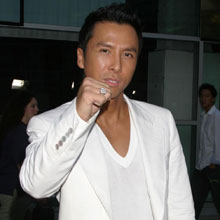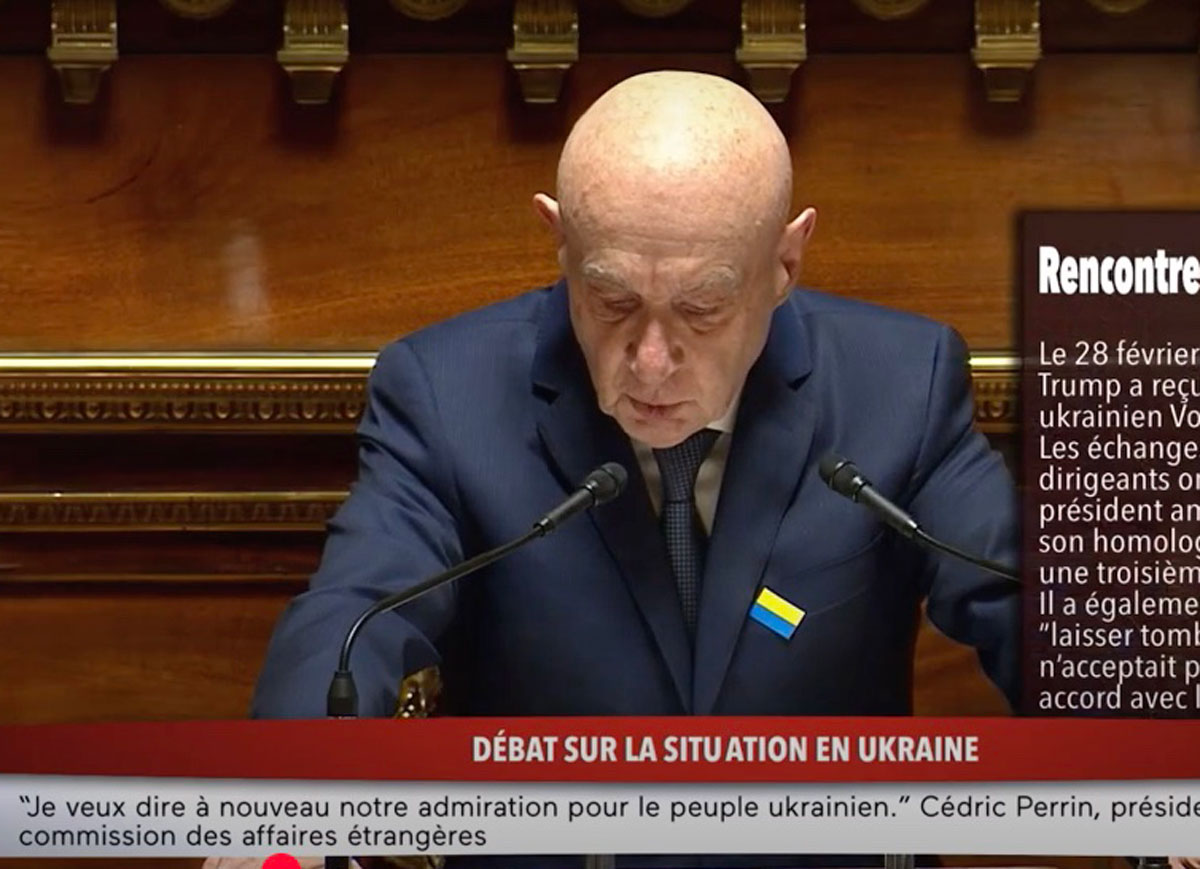Donnie Yen And Peter Chen On 'Wu Xia,' Martial Arts Movies
He's China's hottest action star who's joining forces with renowned Chinese director Peter Chen on the martial arts adventure film, Wu Xia, which was the talk of Cannes. Donnie Yen and director Chen spoke exclusively with Uinterview at the 2011 Cannes Film Festival.
Yen, an actor, martial artist, film director and producer, was born in China, and raised in Hong Kong and Boston. Influenced by his mother, a martial arts grandmaster, Yen spent much of his time in Boston dabbling in different styles of martial arts until his parents finally sent him back to China where he did a two-year martial arts training program in Beijing. As he was about to return to the United States, Yen met up with action choreographer, Yuen Woo-ping who has also worked with actors Jet Li and Michelle Yeoh.
Yen has appeared in films opposite Jackie Chan (Shanghai Knights), Jet Li (Once Upon A Time In China II) and Yeoh (Wing Chun). Yen is foremost a martial artist and secondarily an actor, which has allowed him to bring MMA and other types of Martial Arts into the mainstream culture of China. He is most widely credit for popularizing the style of martial arts called Wing Chun, which came from his film Ip Man, in which he plays the original Wing Chun master.
Chan named Yen the top action actor in Hong Kong, which is no wonder why Chan casted him in his latest film, Wu Xia. Chan was born in Hong Kong and raised in Thailand. He attended UCLA where he studied filmmaking, but did not complete his degree. Instead of finishing his studies, Chan returned to Hong Kong where he held an internship as a second assistant director and producer. Chan is a widely accomplished director of 14 films and producer of over 30. He has won various Hong Kong and other Asian Film Festival Awards for his films, The Warlords, Comrades: Almost A Love Story and Perhaps Love. The later was one of the top grossing films of 2005 in China, Hong Kong and Taiwan. Chan’s Hollywood directorial debut was in 1998 with The Love Letter, starring Ellen DeGeneres, Blythe Danner, Kate Capshaw and Tom Selleck.
Now, Peter Chan and Donnie Yen are taking Cannes together for their very first time in lieu of their new action film, Wu Xia, their latest action thriller. When we caught up with them, Yen and Chan gave us some insight into their collaboration. “Before we had a script or a story or even an idea, our only common thread for the both of us was our love for that genre and movies form the 60s and 70s of Shaw Brothers,” Chen told Uinterview exclusively. “So we wanted to pay homage to that era. We wanted to go back to the origin of martial arts films.”
1 Comments
Leave a comment
Donnie Yen: I worked for him a few years ago on a film called Bodyguards and Assassins, and I’ve always been a big fan of his work. Even though I’ve been in a lot of action movies, I don’t watch action movies. I like dramatic movies. I love his movies from way back. Chen: And he came to our rescue. He helped us completely redo one of his final action scenes in the [Bodyguards] film. It was shot and it was not good so he decided to take two weeks off from his other movie and come back and shoot the scene as action director – not credited. And it was one of the most amazing action scenes in the last decade. And that I thought maybe with him as a partner, if he would agree to be director of the action scenes, I could dare to challenge the Wu Xia genre at least once. So that’s how it all started.
Yen: Well, I didn’t literally do it [laughs]. Because of [actor] Jimmy Wang, cutting off the arm — there’s a certain irony to him being in the film and cutting off my arm. That brings us back to the movie that made him famous [The One-Armed Swordsman]. Peter did not want to remake The One-Armed Swordsman. Chen: But we like that film so much. Yen: Somehow it just ended up with me cutting the arm. Chen: We decided on the arm cutting literally days before we shot the ending. I always like to improvise on set but not to that extent. We don’t change the skeleton of the film. And we actually did for this film. I think there’s a certain playfulness on this set that I’ve never experienced. I don’t know how he works but it shows in a lot of Tarantino’s films. It’s so daring that there’s a certain playfulness that you think maybe when they were doing it, they were having a lot of fun. That’s exactly what we had. We had a lot of fun. We said, 'Why the hell not? Let’s do it!
Chen: Well, it’s actually not a remake or a reinterpretation. Donnie and I were a big fan of in the 60s and 70s genre films. Wu Xia, the name of the film, is actually the name of the genre. Wu Xia really means "martial arts." Some people interpret it as what martial arts should be. It’s really just a genre. It’s the old, glory days of Shaw Brothers 1960s-1970s martial arts genre. The film has nothing to do with any of the films that came previously. But because Donnie and I are both big fans of The One-Armed Swordsman, there were speculations with the Chinese press that we were making The One-Armed Swordsman. And, because everyone thought we were remaking that film, I thought, 'What the hell.' When we were doing the ending, we improvised. We chopped off his arm at the end of the film. But it really had nothing to do with the other film.
Chen: My working process has always been very improvisational. The origin of the film is because I have never done a martial arts film before. Being a fan of that genre, I’ve actually only done dramas and movies that are very densely plotted with multi-layered characters that need two-and-a-half hours just to get the story straight. Before we had a script or a story or even an idea, our only common thread for the both of us was our love for that genre and movies from the 60s and 70s of Shaw Brothers. So we wanted to pay homage to that era. We wanted to go back to the origin of martial arts films. And the origin is really traditional martial arts. But the thing is, over the last 30 years by different evolutions of martial arts films, that they became more magical almost science fiction in a way. It is going further and further away from the original martial arts film. So we wanted to go back to the origin. But as we were doing that, we realized that we couldn’t just go back to the origin, because then you would just rent a DVD. So what we ended up doing is trying to think of something that actually could complement the original style of actions that are more humanly possible that you don’t need wires and you don’t leap ten floors and get totally in the realm of fantasy. It just so happened that late one night, I saw a Discovery Channel program that shows a bullet cutting through human flesh. And it indicated in endoscopic detail what a bullet does to your body and how it kills you and ultimately causes a heart failure. And I thought, what can we apply that to? And that’s the beginning – no story, no characters, nothing. We got very excited and we started developing the characters and the script at the same time. This is the first time I have a movie developed in a way where style comes first and content is all made to service the style, instead of the other way around, which is very rare in my developing process. Then you start to want to do something different with the drama and even though the story is not really as dense, it could be told in an hour and that leaves a lot of room for special effects and all the details, but at the same time, I got to experiment with stuff that I like dramatically. Whether it is the father-son relationship or the yearning, unrequited love either between Donnie and [actress] Wei [Tang] or [actor] Takeshi [Kaneshiro] and his ex-wife, which are more like my older films. That stuff started coming in. And also the detective story, the layer and layer that you peel off, the film noir aspect. Then it becomes a breeding ground and you get a lot of elements. Is it tonally coherent? I just try to do my best. When you become a director, you start to get very greedy and you shoot everything and you try to assemble it together in the editing room.
Yen: I try to be as innovative as possible in every one of my films, whether I’m acting or action directing. For me, the challenge is trying. But to be in his movie, taking it up another notch, that’s another challenge. Plus, in the acting department, this is probably the most complicated, most difficult role that I have taken on — not just for me, but for any actor. It’s a really complicated role. So to take on these two roles, as an actor and an action director, that itself is loads of pressure. But I like pressure. I couldn’t sleep every day. Chen: He’s one of the most hard-working movie stars and action directors I’ve ever seen. Because he always wants more and more, it’s never good enough for him. Sometimes I sit in on his action scenes when we do two-units and he would just roll takes over takes over takes. And I can’t tell the difference between the takes. He’s such a perfectionist. What’s really difficult for him in this film is – first of all, this is the most multi-layered role he has ever played and it requires a lot from him as an actor. At the same time, he still has a duty of an action director. When he’s such a perfectionist on the action side, then it gets very complicated. Because, sometimes in the middle of his action shoot, we need the drama scenes and we gotta drag him over, and he’s gotta let his assistant to run the shots. And he would come over and get into the mood of the scene. Look at the scene where he confronts his father over the dining table in his home at the end. And his father was telling him the story when he was a little kid, and the father started laughing. And you can see tears in his eyes. It was such mixed emotions because what he set out to do today is come back and kill his father. But at the same time, his father is telling him a long, past history that they share together, and he can’t help but cry and laugh at the same time. It seems like that evil blood is still in him, and it was so difficult. That was the kind of acting that is difficult for any actor. For Donnie to be able to do that in the middle of all this action mess that he’s going through — it’s really incredible.
RELATED ARTICLES
Get the most-revealing celebrity conversations with the uInterview podcast!






Man, that arm cutting scene sounds brutal!